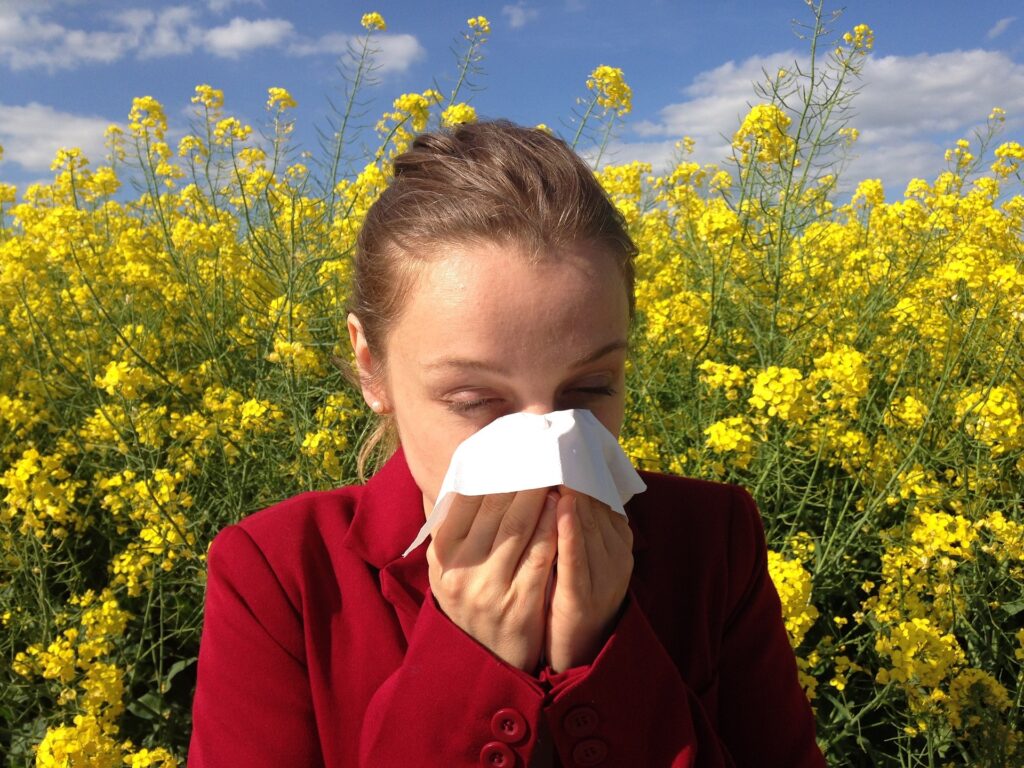
How to get rid of allergies permanently? Unfortunately, there is no known way to completely get rid of allergies permanently. Allergies are caused by the body’s immune system reacting to harmless substances, such as pollen, dust, or certain foods.
While there are many treatments available to manage allergy symptoms, such as antihistamines, nasal sprays, and allergy shots, none of these treatments can completely eliminate allergies.
The most effective ways to manage allergies
One of the most effective ways to manage allergies is to identify and avoid the allergen triggers. This can be done through allergy testing, which can help identify specific allergens that trigger an individual’s symptoms.
Once the allergens are identified, steps can be taken to minimize exposure to them. For example, if an individual is allergic to pollen, they can minimize their exposure by staying indoors during peak pollen times, using air filters, and keeping windows closed.
Another way to manage allergies is through immunotherapy, also known as allergy shots. Allergy shots work by gradually exposing the body to small amounts of the allergen over time, which can help the immune system build up a tolerance to the allergen.
This can lead to a reduction in allergy symptoms over time, but it is important to note that this is not a permanent cure and the shots may need to be continued indefinitely.
In addition to these treatments, there are also many home remedies that can help manage allergy symptoms. These include using saline nasal sprays, taking steam showers, using essential oils, and drinking herbal teas.
While these remedies may provide temporary relief, they are not a permanent solution and should be used in conjunction with other allergy treatments.
It is important to note that allergies can change over time, and what may have triggered allergies in the past may not be a problem in the future. It is also possible for allergies to develop later in life, even if an individual has never experienced allergies before.
Therefore, it is important for individuals with allergies to continue to monitor their symptoms and work with their healthcare provider to develop a treatment plan that works best for them.
While there is no known way to completely get rid of allergies permanently, there are many treatments available to manage allergy symptoms. These include identifying and avoiding allergen triggers, immunotherapy, and home remedies.
How to get rid of seasonal allergies permanently
Seasonal allergies, also known as hay fever, are a common condition that affects millions of people worldwide. The symptoms of seasonal allergies include coughing, sneezing, runny nose, itchy eyes, and congestion, and they can be quite debilitating.
While there is no permanent cure for seasonal allergies, there are several ways to manage the symptoms and reduce their impact on your daily life.
One of the most effective ways to manage seasonal allergies is to limit your exposure to allergens. This can be done by staying indoors during peak pollen hours, closing windows and doors, using air conditioning, and wearing a mask when outside. Additionally, it is important to keep your home clean and free of dust and mold, which can exacerbate allergy symptoms.
Another way to manage seasonal allergies is to take over-the-counter or prescription medications. Antihistamines, decongestants, and nasal sprays can help alleviate symptoms such as itching, sneezing, and congestion.
Immunotherapy, or allergy shots, is another option for people with severe allergies. These shots work by gradually exposing the body to small amounts of allergens over time, which can help reduce the severity of symptoms.
In addition to medication and limiting exposure, there are several natural remedies that may help alleviate seasonal allergy symptoms. These include:
Eating a healthy diet rich in fruits and vegetables, which can boost the immune system and reduce inflammation.
Drinking plenty of water to help flush out allergens and reduce congestion
Using a saline nasal rinse to help clear out mucus and allergens from the nasal passages
Taking supplements such as quercetin, vitamin C, and omega-3 fatty acids, which have anti-inflammatory properties
It is important to note that while natural remedies may be helpful in managing seasonal allergies, they should not be used as a substitute for medication or immunotherapy. It is always best to consult with a healthcare provider before starting any new treatment regimen.
While there is no permanent cure for seasonal allergies, there are several ways to manage the symptoms and reduce their impact on your daily life. Limiting exposure to allergens, taking medication, and using natural remedies can all be effective in managing seasonal allergies.
If you are struggling with seasonal allergies, talk to your healthcare provider about the best treatment options for you.
How to cure allergies forever
Allergies are a common condition that affects millions of people worldwide. They occur when the immune system overreacts to a foreign substance, such as pollen, dust, or pet dander. Symptoms can range from mild, such as sneezing and a runny nose, to severe, such as anaphylaxis, which is a life-threatening reaction.
Unfortunately, there is no cure for allergies. However, there are several ways to manage symptoms and reduce the risk of an allergic reaction. One of the most effective ways to manage allergies is to avoid triggers. This may include staying indoors during high pollen counts, using air filters, and avoiding certain foods.
Another way to manage allergies is through medication. Antihistamines, decongestants, and nasal corticosteroids can all help to reduce symptoms. Immunotherapy, which involves exposing the body to small amounts of an allergen over time, can also be effective in reducing sensitivity to allergens.
In addition to medication, there are several natural remedies that may help to manage allergies. These include:
Probiotics: Some studies have shown that probiotics may help to reduce allergy symptoms by improving gut health.
Local honey: Consuming local honey may help to reduce allergy symptoms by exposing the body to small amounts of pollen.
Quercetin: Quercetin is a natural compound found in certain foods, such as onions and apples. It has been shown to have anti-inflammatory properties that may help to reduce allergy symptoms.
Vitamin C: Vitamin C is a natural antihistamine that can help to reduce allergy symptoms.
Butterbur: Butterbur is an herb that has been shown to have anti-inflammatory properties and may help to reduce allergy symptoms.
It is important to note that natural remedies may not be as effective as medication and may have side effects. It is always best to consult with a healthcare provider before trying any new remedies.
There are several ways to manage symptoms and reduce the risk of an allergic reaction. Avoiding triggers, taking medication, and trying natural remedies may all be effective in reducing allergy symptoms. It is important to work with a healthcare provider to determine the best course of treatment.
How to prevent allergy on skin
Allergies on the skin can be a frustrating and uncomfortable experience. Fortunately, there are several steps you can take to prevent skin allergies from occurring. These steps range from avoiding certain substances to taking medications as prescribed by your doctor. Here are some tips to prevent skin allergies:
Avoid Triggers: The first step in preventing skin allergies is to avoid the substances that trigger them. Common triggers of skin allergies include certain soaps, detergents, fragrances, and metals such as nickel. If you know what triggers your skin allergy, try to avoid them as much as possible.
Wear Protective Clothing: If you are exposed to a substance that triggers your skin allergy, try to wear protective clothing such as gloves or long-sleeved shirts. This can help to prevent contact between your skin and the allergen.
Use Moisturizer: Keeping your skin moisturized can help to prevent skin allergies. Dry skin is more prone to irritation and can make existing allergies worse. Use a fragrance-free moisturizer to keep your skin hydrated.
Take Medications: If you have a skin allergy, your doctor may prescribe medications to help manage your symptoms. These medications may include antihistamines, corticosteroids, or immunomodulators. It is important to take these medications as prescribed by your doctor.
Use Anti-Itch Cream: Over-the-counter anti-itch creams such as hydrocortisone or calamine lotion can help to relieve itching caused by skin allergies. Apply these creams as directed on the package.
Keep Epinephrine Auto-Injectors with You: If you are at risk for anaphylaxis, keep your epinephrine auto-injectors with you at all times. Epinephrine is the only treatment for a severe allergic reaction. It is only available through a prescription from your doctor.
Cool Your Skin Down: Cooling your skin down could offer immediate relief if your skin is burning up and itching. Dip a clean and soft towel in cool water and then use it as a compress on the affected area. You could also use a thin cloth and an ice pack, the cloth is there to prevent frost bites, as extreme cold could actually only further irritate your skin.
Preventing skin allergies involves avoiding triggers, wearing protective clothing, using moisturizer, taking medications as prescribed by your doctor, using anti-itch cream, keeping epinephrine auto-injectors with you.

Food allergy treatment at home
Food allergies are a common problem that affects many people around the world. The symptoms of a food allergy can range from mild to severe, and in some cases, they can be life-threatening. While there is no cure for food allergies, there are several home remedies that can help alleviate the symptoms.
One of the most effective home remedies for food allergies is ginger tea. Ginger tea has been used for centuries to treat various ailments, including nausea and digestive problems. It is believed to help speed up digestion, which can benefit those with stomach discomfort and indigestion caused by trigger foods.
To make ginger tea, simply steep fresh ginger root in hot water for a few minutes, strain, and drink.
Another home remedy for food allergies is vitamin C. Vitamin C is known for its ability to remove toxins from the body, which can help alleviate the symptoms of food allergies. Foods that are high in vitamin C include kiwi, strawberries, oranges, and broccoli.
Incorporating these foods into your diet can help boost your vitamin C intake and reduce the severity of your food allergy symptoms.
Probiotics are also a popular home remedy for food allergies. Probiotics are live bacteria and yeasts that are good for your health, especially your digestive system. They can help improve your gut health and reduce inflammation, which can help alleviate the symptoms of food allergies. Foods that are high in probiotics include yogurt, kefir, sauerkraut, and kimchi.
In addition to these home remedies, there are several other lifestyle practices that can help reduce the severity of food allergy symptoms. These include avoiding trigger foods, reading food labels carefully, and carrying an epinephrine auto-injector in case of a severe allergic reaction.
While home remedies can be effective in alleviating the symptoms of food allergies, it is important to remember that they are not a substitute for medical treatment. If you suspect that you have a food allergy, it is important to consult with a healthcare professional for proper diagnosis and treatment.
Food allergies can be a challenging and sometimes life-threatening problem. However, there are several home remedies that can help alleviate the symptoms of food allergies. Ginger tea, vitamin C, and probiotics are just a few of the many effective home remedies for food allergies.
Additionally, it is important to practice good lifestyle habits and seek medical treatment when necessary to manage food allergies effectively.
